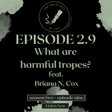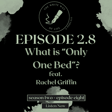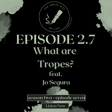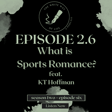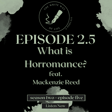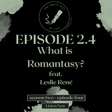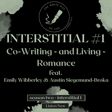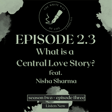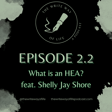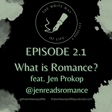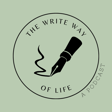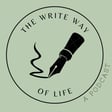Become a Creator today!Start creating today - Share your story with the world!
Start for free
00:00:00
00:00:01

What is Voice? - featuring Emily X. R Pan - Episode 3 - Season One - The Write Way of Life
This week’s episode features Emily X.R Pan, a New York Times bestselling author of young adult novels, including the acclaimed “The Astonishing Color of After.” Emily chatted with Karis and Adi about the elusive concept of voice for fiction writing. We delved into the differences between authorial and narrative voices, along with getting some great hands-on tips from Emily. Stick around for the end of the episode, where you’ll get a mini chaotic review session with Adi and Karis about Karis’ long con of being an Emily X.R. Pan fangirl.
Transcript
Introduction and Personal Updates
00:00:16
Speaker
All right. Hey, Addie. We're back at it for our third episode of the Right Way of Life podcast. when When is it? when ah we We are recording this um on March 9th, Sunday ah in the year 2025.
00:00:33
Speaker
ah twenty twenty five so we're really cutting it down to the wire to get this recorded so that we can post the episode tomorrow. But you know, that's that's sometimes just how the cookie crumbles. Yeah, so it is literally the day before this episode.
00:00:48
Speaker
How are you feeling? Just like, i don't know, in life.
Impact of Daylight Saving Time
00:00:53
Speaker
i I mean, today was a rough day, I think, because ah we experienced the jump forward. So we lost an hour. Oh, you're right. So, yeah, really, it's not six o'clock at night. It's five, but it is six.
00:01:05
Speaker
And so that's that's been fun on my sleep schedule. But I don't know about New York, but it's very sunny here in in the Midwest, which is great for my seasonal depression.
00:01:17
Speaker
You know, it used to be sunny and then 7 o'clock hit and the the sun went down. So, alas, it is dark. But being that it is March 9th, happy birthday shout out to my mother.
00:01:28
Speaker
um Doubt she's listening to this, but if she is, happy birthday, mom. Happy birthday, Karis' mom. and There we go. what does that What does that make your mom then? is is she Pisces? She's a Pisces, just like my cat.
00:01:43
Speaker
all
00:01:46
Speaker
Lizzie's birthday. It's coming up. Be ready. Okay. Got it. Yeah. Get the catnip.
Karis's Reading Adventures
00:01:53
Speaker
um This week has, was really exciting for me and for like a lot of people because it was Oathbound's release. If you're unfamiliar, Oathbound is book three in the Legendborn cycle.
00:02:06
Speaker
Legendborn is a YA contemporary fantasy series by Tracy Dion that is just impeccable and I was so excited for this third book that I would not only went to a midnight release on Monday night which is wild because my bedtime is like 9 30.
00:02:23
Speaker
um I also went to the launch event on Tuesday at Barnes & Noble and now I have this massive incredible book waiting for me to read it that's amazing I'm very excited because now I get to read all three of the books in one sitting probably at the end of this month when I have time binge them and then you can suffer with the rest of us while we wait for book four what do you mean book I thought this was a trilogy no it's at least four books it's a cycle Karis I feel like I feel like you've told me before that this was three books I feel like I've been boozled I don't think I would have said that um what have you read this week
00:03:00
Speaker
I have not.
Karis's Writing Projects
00:03:02
Speaker
I've been working on reading two books, one that is nonfiction and one that is fiction because um my brain needs both. And so haven't finished anything, though, which is sort of sad because it's the the fiction book is ah All Systems Read by Martha Wells, which is a novella.
00:03:18
Speaker
I mean, that like sci fi world. And then I'm reading like a nonfiction book about. The like deep sea ocean and like deep like sea thermal vents and how they mimic um outer planets and their like coldness. and That short story that I read this week makes a lot more sense.
00:03:40
Speaker
Yes. Yes. Yes. yes Yeah. I wrote a I wrote a short story about ah somewhat religious sentient anglerfish. that was really good 10 out of 10 would recommend thanks uh speaking of reading i actually haven't read oathbound yet but i did read four books in god this this book series has absolutely ruined my life um it's a male male self-published
00:04:12
Speaker
soccer new adult series and when i tell you that hmm brain rot the the brain it's rotted the brain cells they're gone i need to i need like i need some time caris what is what's the what's the book called we got to shout it out okay so the series is the lsu series that stands for london southwark university not louisiana state university which Took me a hot
Book Recommendations and Writing Updates
00:04:40
Speaker
sec.
00:04:40
Speaker
And it's by Becca Steele. S-T-E-E-L-E. So go off Becca Steele. Yeah. So if anyone needs like a he's like a rom-com fix.
00:04:51
Speaker
I wouldn't say rom-com so much as I would say it's like steany and angsty. see Oh, even better. Yeah. Especially if anyone had terrible Valentine's Day events.
00:05:05
Speaker
The LSU boys will fix you.
00:05:09
Speaker
Have you written anything other than your short story this week? I wrote, I've written some books in my in my ah MLM rom-com. So that's fun.
00:05:21
Speaker
that. So we're chugging along there. We'll get that finished at some point this spring. It's going to happen. Karis is going to bully me into finishing it. I love to bully people.
00:05:32
Speaker
What? i shouldn't I should not have said that in a recorded space. No, it's it's like it's like a gentle, healthy bullying. You know? We're going to clip that and they're going to put it on the internet.
00:05:44
Speaker
We can just claim it's ai That's fine. Oh, you're so right. Yeah. I um have been trying to write my young adult novel ever since I sent my adult romance novel off to my agent a week ago.
00:05:56
Speaker
And it's not going well. I'm struggling. it's I do blame the books. The books have made it hard to read. I mean, to write. Oh, I see. I see. it Because you're like you. Yeah, I read like a thousand pages of book this week.
00:06:11
Speaker
You needed that. You have to like refill your creative well, right? i sure did Yeah. um
Interview with Emily X.R. Pan
00:06:18
Speaker
All right. Well, now that now that we've chatted way too much about that, um this episode is super exciting because we got to talk with the one and only Emily X.R. Pan.
00:06:29
Speaker
So I'm going to read Emily's bio and then we'll hop into the interview. All right. Emily X.R. Pan is the New York Times bestselling author of The Astonishing Color of After, which won the APALA Honor Award and Walter Honor Award.
00:06:46
Speaker
It was also a finalist for the l LA Times Book Prize, long listed for the Carnegie Medal, and named by Time Magazine as one of the 100 best YA books of all time.
00:06:57
Speaker
Her latest novel, An Arrow to the Moon, was an instant national bestseller, a Locus Award finalist, and featured on NPR's Best Books of 2022. Emily is currently on the faculty of the Creative Writing MFA program at the New School.
00:07:13
Speaker
She has also taught at Harvard University, New York University, and Vermont College of Fine Arts. Without further ado, Emily X.R. Pan.
Understanding Voice in Writing
00:07:25
Speaker
um Okay, yeah, so here we are today to chat about the craft topic of voice with the incredible Emily XR Pan. um I know Emily from being a big fangirl on the internet and also from ah Vermont College of Fine Arts, where those of you who heard our intro episode with Martha Brokenbro, she was also a VCFA, so this is just a big reunion podcast.
00:07:52
Speaker
I love it. Yeah. But I really wanted to chat about voice. And I just want to start with like the basic description of like, what is your best way to define what voice if you were talking to ah new writer or someone who has no writing experience?
00:08:09
Speaker
Well, i would start by differentiating, I think, between the voice of the character and the voice of the author, which sometimes is one in the same, but sometimes is different.
00:08:22
Speaker
And I would say that voice is the thing where You know, you let's say you're imagining something that your best friend is going to say in response to you. You imagine that you're you're telling your best friend this fun story of what happened last Saturday. And you can already hear in your head what your friend is going to say.
00:08:43
Speaker
That is voice. Right. And that specifically is character voice that. interior sense of what slang do we default to? What language do we default to? What way do we string along words? and And what do we, what emotionality do we embody them with? You know, some of it is personality and some of it is...
00:09:10
Speaker
cultural and some of it is just an instinctive thing that develops. So that is character voice. Sometimes an author might write in such a way where there's a a differentiation to be made between author voice and character voice, where you can distinctly tell that somebody is narrating a story and That there is then a character or many characters who have distinct voices within that story. And all of that kind of goes back to the same thing, which is a combination of sound and cadence and rhythm.
00:09:52
Speaker
There are just so many different components that go into it that it's a little bit hard to pin it down as one specific
Crafting Unique Character Voices
00:10:00
Speaker
thing. But I think the easiest way to get somebody new to understand it is, you know, the voice of your mother. you You're going to say something on the phone that's, you know, is going to provoke a specific reaction and you can hear your mother in your ear.
00:10:19
Speaker
that's her voice. Her voice is in your brain, you know? Yeah, I love that. And I love that you immediately differentiated between character and like narrator author voice, because that was, I was going to ask that later. Like, is there a difference?
00:10:34
Speaker
And there is. oh I, when I started writing, I thought the voice just was instinctual. I didn't have like any sort of
00:10:46
Speaker
intentional techniques that I use to craft my character voice. And so it was my first works were very voicey, but they were also kind of samey in that i I sort of landed on a voice that was more, it was a mix of my author voice and my character's voice. And the characters were all kind of the same, but I have friends who I've read their work and I can tell, you know, they're very voicey, but they, I read, you know, a kid lit manuscript and it's one type of,
00:11:16
Speaker
sarcastic, biting voice and then I'll read an adult manuscript and it's similar but totally different. um Which I think is a really cool skill, by the way, to be able to do that. um well What are some like...
00:11:30
Speaker
Do you have like tips and tricks for like how to create a believable voice or like an authentic or unique voice for your character, for your narrator, <unk> etc.?
00:11:42
Speaker
I love to give my students free writing exercises. And a lot of the time i will challenge people to sit and write journal entries in the voice of one specific character and then in the voice of another character. I will also oftentimes suggest that people just go to, say, a cafe, somewhere where you can eavesdrop real easily and pick a specific voice and see if you can pin down what is it about how someone speaks and
00:12:16
Speaker
you know are they Do they have a specific specific accent? But even an accent isn't enough for a voice. It's something about the words that they default to. It's something about the way that they think about how they present themselves.
00:12:32
Speaker
you know Our voices are ah an audio manifestation of our personalities. And so much of what we're what is happening in conversation is relating back to what we want to communicate. I say the word want very intentionally because what does your character want?
00:12:53
Speaker
What is your character driven by? so sometimes I have students who are, you know, they're writing multi POV stories where every chapter is a different character and they struggle with getting them to sound different.
00:13:09
Speaker
And I always say, well, this character wants, this one specific character wants different things than this other character. This character is ambitious and that character is looking to run away.
00:13:21
Speaker
And you can really have that seep into...
Voice and Character Desires
00:13:25
Speaker
Not only their voice, but their thoughts, right? Like the voice of a character who is ambitious might be that everything she says is about trying to prove herself. There's an edge to everything.
00:13:36
Speaker
And all of her thoughts, which should also reflect a bit of that voice, can... be about trying to demonstrate something and illustrate how capable she is.
00:13:49
Speaker
A character who is just trying to escape could have a voice that is a little bit meek, a little bit don't look too hard at me, a little bit like constantly plotting and scheming and thinking about the way out.
00:14:05
Speaker
All of that gets wrapped up into how a character presents themselves and what words they might choose to use and how they might think about language. You know, a character who's trying really hard to be ambitious, their voice might be really strong. They might use a lot of incendiary language. They might use a lot of attention grabbing language and and and think a lot about trying to sound bombastic, for example, and And a character who's trying to escape unnoticed might speak in shorter sentences, might be less confident.
Unreliable Narrators and Perception
00:14:40
Speaker
Everything might be a little more like, um, um, this and um, that, like very meek and mild, right? Everything might be a little bit more, um, ah submissive and quiet and afraid.
00:14:56
Speaker
Do you ever find that your characters' voices are different in their mind versus out loud? Yeah, I think that is something... Well, I don't know if you mean intentionally or accidentally.
00:15:10
Speaker
little bit of both. like Almost like they can be maybe like unreliable a little bit, and sometimes they're doing it on purpose. you know like they're like I'm thinking of, say, the ambitious character that you brought up. like Let's say it's a... i'm just going to create a character. like It's a a young woman who wants to take the throne, and so she's being really ambitious, but on the inside, maybe she's insecure, and so...
00:15:34
Speaker
Out loud, she's saying things like, absolutely, when I'm queen, we'll do this. And on the inside, she's like, God, I hope I get to be queen. Yeah. Yeah, I think that's ah an area where voice can do really specific work. Like, as you're saying, creating this unreliability and having a character who is trying so hard to present herself as strong that maybe she overreaches with her words.
00:15:59
Speaker
Right. And she overreaches with her language or she's maybe even a little bit grating with her language when the interiority that we get is her worrying and doubting herself and and panicking over how people perceive her.
00:16:16
Speaker
Yeah, I ah feel like I'm having like an epiphany right now because I've always wanted to write an unreliable character. And I was like, i just, i don't know. I just don't know if I've got the brains for it. Like, I don't
Voice and Narrative Development
00:16:26
Speaker
know how to do it. And it's occurring to me that voice can be a really good, I mean, there's obviously plenty of craft elements that can go toward creating the unreliability, but voice can be a very good, like...
00:16:36
Speaker
Oh, God, like maneuver, like way to get people on the the unreliability train. I just lost my way. Yeah, like a ah device or a vessel, perhaps is what you meant. Yeah, that is exactly what I meant.
00:16:49
Speaker
Yeah. Yeah, it can absolutely be a tool used for that. You can manipulate voice in so many different ways. I think that's why it's so interesting. and And my favorite, my personal favorite is probably when people use voice to kind of manipulate the audience's perceptions of them. okay you know um uh i'm thinking of for example karen russell wrote this short story called saint lucy's home for girls raised by wolves and it's about these wolf girls who are brought into a they're like actual girls who were
00:17:33
Speaker
literally raised by wolves and they have wolfish behaviors and they are being rehabilitated. They're put into this private school to rehabilitate them so that they can be proper human girls.
00:17:46
Speaker
And so the entire story is about that. And the entire story happens by showing you the the different stages from the from their lycanthropic handbook.
00:17:59
Speaker
And they're trying to assimilate. And the story begins with of them as pack of girls, a pack of wolf girls who all the language is very wolfish and wild and feral.
00:18:15
Speaker
And it's about all of them in this wee voice. They have the same dreams. They have the same perceptions of things. and then heartbreaking is that as the story progresses as these girls become successfully rehabilitated, there is a moment where where the story has a fissure in it.
00:18:39
Speaker
And suddenly we start getting individual names and we start to focus in on a main character whose name is Claudette. And then the story goes into Claudette's voice. So it starts out as a pack.
00:18:53
Speaker
It's the pack's voice. And then it goes into Claudette's voice. And you see this individuality being brought in because part of rehabilitating these wolf girls is that they are they're ceasing their function as a pack.
00:19:10
Speaker
And they're being encouraged to behave more human. So you then learn about Jeanette, who is like the best of the Wolf Girls. And you learn about Mirabella, who's like the failure. And Claudette is somewhere in in between.
00:19:25
Speaker
There's a pun where she says she's solidly middle of the pack. And you get to see these dynamics and this competitiveness growing and festering among these girls.
00:19:41
Speaker
And the voice follows that transition. So it's heartbreaking when you look at the voice because you can see their sisterly dynamic crumbling as you go through the story.
00:19:54
Speaker
I think that's the most interesting use of voice to me is when a when an author can tie the voice to what is happening narratively. Yeah, it's
Voice as a Multi-Purpose Tool
00:20:05
Speaker
sort of like instead of the the concept of um I can't remember who said it, but it was in a class or a workshop and they said, like, in poetry verse every word has to do like two or three different tasks and it's almost like voices doing that too like it's not just conveying the character it's also conveying the plot and it's also you know driving other aspects
00:20:32
Speaker
Absolutely. Which think is so cool. And God, I can't imagine how much work must have gone into crafting that story because it sounds absolutely incredible.
00:20:44
Speaker
And I imagine that it was part of her initial concept of the story. I imagine that when she sat down to write it, she knew that she wanted to do that.
00:21:00
Speaker
that's what i That's what I imagine. I mean, i mean Karen Russell's an incredible writer. But I think that you know so much of that can also happen in revision. and Sometimes we we sit down and we fast draft something, perhaps, or we we just kind of you know dump everything out of our brains onto the page.
00:21:22
Speaker
And there's something beautiful in that momentum and in that That freedom to be messy and imprecise and and just create, I feel like that taps into ah a childlike experience of writing that many of us writers can remember from when you were ah kid and you were just scribbling away in your notebook.
00:21:48
Speaker
And then in revision, you can go, ah, now this would be interesting to do. Now I could transform this character by adding in these different layers, these different components. I can rewrite this to give this character a voice that is serving x y and Z purposes.
00:22:10
Speaker
Yeah, I love that. I love the sort of fast draft where it's like
Exploring Narrative Perspectives
00:22:15
Speaker
instinctual, right? Like you're just, you're kind of Go by the seat of your pants, which is, you know, why they call it pantsing.
00:22:22
Speaker
ah And then when you go back in revisions, that's when you can sort of see, like, what the magic was that you created in the drafting process. And you can sort of refine it and, like, deepen it and just make it so much shinier.
00:22:36
Speaker
um Yeah. And how do you... So when you're writing, not so much when you're reading, but do you find that there's like a ah difference in how the character voice comes across if you're writing in first person versus third person point of view Yeah, there is definitely there's definitely a difference that appears kind of instinctively. And I think some of that is that when you're in first person, first of all, there's this immediacy, right?
00:23:09
Speaker
That i me it just like right away, it draws you in and forces you to think about how is this person, how is this character existing in the world?
00:23:20
Speaker
What is this character fixated on? And sometimes that can be really useful. And sometimes I find it for myself to feel almost gimmicky when I'm writing that way.
00:23:35
Speaker
So sometimes I actually will purposely pull back and switch into third person just to try to see what is it that I'm trying to accomplish?
00:23:50
Speaker
Am i kind of leaning on the same old tactics when I write in first person, because I think it's really easy to default to sort of as you were saying earlier that your your character kind of sounded like a jumble of of you and and certain other things.
00:24:10
Speaker
I think it can be really easy for me to fall back on what my voice sounds like, what other characters I've written have sounded like, what characters I've done a lot of reading of sound like.
00:24:23
Speaker
And sometimes I question myself a little bit. And so I i think most... Almost everything I've written, I think I've experimented in switching from first person to third person, back to first person, perhaps.
00:24:41
Speaker
And that's one way for me to try to figure out what exactly is it that I'm trying to accomplish with this character and with this voice.
00:24:53
Speaker
That's interesting because I tend to, when I'm writing, i tend to get very, like, My eyes are too much on the horizon sometimes.
00:25:04
Speaker
And it's like, I just want this to be a finished product. I want it to be something that I can send out in the world. And so I'm going sit down and I decided to do it in first person. So we're just going to like charge ahead like a bull in a china shop.
00:25:16
Speaker
And this is making me think that there's there's so much value in.
00:25:23
Speaker
tate letting the process just be a process and be a journey and like you mentioned earlier having your students do free writing and journal entries like that's all things that I don't always include in my writing process that I'm thinking it could be really beneficial to sort of add in the time to do
Free Writing and Voice Consistency
00:25:40
Speaker
that right like yeah how much deeper could my books be like deeper not as in like you know how much more could they be saying how much more could I be doing with each paragraph if I were truly as intentional as possible about every choice that i put into my books um and i don't often think about that with voice because i i do i have for so much of my writing life really thought of voices just like that instinct like you know it just it comes and i know it when i know it and i know it when i see it and i've never sort of known how to
00:26:16
Speaker
replicate it or like it talk about it even. um so this has been really helpful just in terms of like, you know, actual like practical like ways to to think about it and to think about it more intentionally.
00:26:32
Speaker
i think it is something that is kind of murkier and hard to grasp. You know, it's It's not something where you can so easily examine like a sentence that has too many adjectives in it. ah but you know yeah it's Some of it is a little bit about how does it feel? How does it sound?
00:26:55
Speaker
And then some of it is also... doing that deep digging into what is it that makes a character who they are and how does that come through in their words and their thoughts and how they carry themselves and all of that.
Embodying Characters Through Voice
00:27:12
Speaker
It almost feels a little bit like I've never taken an acting class, but I imagine it would be a little bit like trying to slip into a character and think about how would this character behave and how would this character even walk or stand, right? Like I think all of those things, i'm I'm doing that type of work when I think about a character's voice and a character's position in the world.
00:27:40
Speaker
And I do a lot of exploration in my writing. I think it's a crucial part of my process is I often complain to my students that The most agonizing part of writing a book for me is that I spend a huge chunk of time in the beginning of that bookmaking process, trying to figure out what the process even is for that specific book. Every single book I've ever written has taken a different process. And I don't do this on purpose because it's truly laborious and annoying. I wish that I had a set process.
00:28:23
Speaker
You know, I have friends who they know that they outline this way and then they block out the beats this way and then they write this way. done. I wish I could function like that, but that's just not how my brain works.
00:28:35
Speaker
And so part of me doing the whole tango of switching back and forth between first person, third person is really me trying.
00:28:47
Speaker
It's one way that I try to figure out what is this book even trying to be? What is this book trying to say? What are the ways in which I need to inhabit the different parts of this book?
00:29:00
Speaker
Sometimes if I write in first person, I'm too close to the character or characters and I need to have a little bit more distance so that I can show off certain facets that, you know, the the interesting thing about first person is that unreliability that you can potentially play with. But sometimes I actually want to be a little bit more zoomed out. sometimes i actually want my readers to get to see things that maybe the characters themselves aren't seeing. And that's part of the story that I'm crafting. And then I have to think about, well, what's my author voice here?
00:29:42
Speaker
How am I supposed to sound
00:29:46
Speaker
narratively, you know, how am I supposed to sound as this this disembodied, off-the-page being that's communicating something to you? And what's the tone of the book? What's the purpose of the book?
00:30:01
Speaker
That all affects... how I go about it, right? Like sometimes you have the narrator who you can clearly hear is there. Like there they're a little bit sarcastic. They editorialize things. They have parentheticals thrown in. They have commentary on what the characters are doing that almost feels a little bit like...
00:30:22
Speaker
I don't know, mystery science theater or just somebody off or offering, you know, a humorous bit of and aside here there. And, and then sometimes you have the narrator that just gets out of the way and you're just completely wrapped up in the story. And that's still a voice, right? That is still a voice.
00:30:43
Speaker
I think there is great skill to be like used both and being a very present narrator and also one that just kind of disappears. yeah right Like the one who's unnoticed to the point where you don't even realize you're being swept up in a story. You're just kind of along for the ride.
00:31:00
Speaker
Yeah. And when that's the voice, when it's that invisible sort of voice, so much of it is the atmosphere that they're creating. And when they are building tension, what are the ways in which that author is kind of pulling at you trying tugging at your expectations
Voice and Thematic Elements
00:31:21
Speaker
and and preparing you for certain twists, like all of that gets gets tied up in what language is used, what's kind of the the pacing, not of the story, but of the words themselves.
00:31:35
Speaker
You know, all of that, I think there's, it's like music. There's this rhythm to it. There's this dance to it. yeah and I think of just the way we're structuring this podcast like this first season is we have like eight episodes that are on separate that craft like elements that we think are foundational so one of them um oh one of them obviously is voice and I'm thinking about how they're not you know we're talking about them in separate episodes but they're all sort of
00:32:10
Speaker
one of each other, right? Like, you can't talk about voice without talking about character, without talking about setting, without talking about, you know, um I forgot everything that I ever had in my brain, but you know, you can't talk about one without the other.
00:32:23
Speaker
And I think of how, when I first started writing, I was writing realistic contemporary books and I was like, I don't have to world build like lucky me. um I still do because, you know, if I'm writing one of the books that I wrote is about a missionary kid in Italy, who's at a boarding school.
00:32:40
Speaker
And she has a very different perspective than another book I wrote, which is about a witch in New York city, right? Like they have, a totally different view of the world and life experience and setting to like color the way that they describe things even.
00:32:56
Speaker
um So I think it's, it's really interesting to consider when you think of a character voice, even like, how is it different if you take a character and you raise them in South Carolina versus New York city versus California?
00:33:11
Speaker
Absolutely. Like same character, same family, everything. But just that one that one difference is changes everything. Oh, yeah, absolutely. Yeah.
00:33:22
Speaker
I, um wow. Okay, I feel very excited right now. And I'm like, I need to go sit down and start drafting a new book, which I can't do because I need to revise a book instead. ah I'm going to put all this to use with that revision.
00:33:37
Speaker
I love that. I know. Yeah. So, okay. Yeah. One question I had was sort of, and we might have touched on this a little bit, but it was sort of how do you separate things?
00:33:48
Speaker
you're your voice, like if you're writing a first person essay, that voice versus your narrator's voice voice versus your character's voice. How do you kind of keep them all separate in your head and on the page?
00:34:02
Speaker
I, when I'm drafting, I try not to stress about it because when I'm drafting, there is a little bit of what I touched on before that momentum, that spark that is, that feels really important where I'm, I'm trying to get into the zone, right? I'm, I'm trying to sink into that trance because that's when it's the most delightful for me.
00:34:29
Speaker
So it's when I'm revising that I will then take my more editorial lens to it and I'll go, okay, what am I trying to say here?
00:34:43
Speaker
Whether that's, as you said, an essay or a piece of fiction, right? I'm trying to decide what is the purpose of everything for this character?
00:34:54
Speaker
What is this character's life pursuit? what this What does this character want? What does this need? Um... With ah an essay, it's kind of similar. It's, you know, if I'm writing an essay or like a blog post, something that sounds
Abstract Approach to Voice
00:35:11
Speaker
very neat, I will inject a lot of myself into it and and I will get very thoughtful and kind of meandering as I tend to be and and let my personal voice really come through.
00:35:26
Speaker
And then sometimes when I'm writing fiction, I have to pull back on that a little bit. I have to be like, oh, wait, would my character really think this way? I don't think so. You know, I have a I'm working on a novel right now where my I want my character to kind of feel meek in the beginning.
00:35:44
Speaker
And by the end of the book, I want her to feel really strong. And I'm trying to figure out how to incorporate that into the voice. And I'm writing it in third person, which makes it a little bit trickier because it's it's less of that automatic interiority all of the time.
00:36:03
Speaker
It's going to be more subtle than that. It's going to be the type of thing where readers might not pick up on it. And it's part of the experience. it part It's part of how they feel about it. But I know that I'm writing it that way.
00:36:17
Speaker
Similarly, I have this book is happening in three acts and each act has a different color palette, if you will. I'm focusing in on different colors and different textures for each setting and it is directly in reflection to my character's strength.
00:36:42
Speaker
So everything is a little bit muted in the beginning. And this might not be very obvious to whoever's reading, but it's obvious to me and it directs me. So I do a lot of work like that to intentionally shape how I think about the writing, how I think about what I'm setting up. I do a lot of kind of aesthetic planning out as I'm figuring out a story. So I literally will sit down and think about all the different senses I could apply to a section of a book, right?
00:37:17
Speaker
If this section of the book were to have a taste, if this section of a book were to have a textural sound to it, what would that be? If this were a movie, right?
00:37:29
Speaker
What choices would the director make? What choices would the colorist make? I think about how the Matrix feels very green, right? That's a very specific aesthetic choice.
00:37:43
Speaker
ah There are a lot of choices like that made in in movies where you'll notice that Certain colors come into play more and I try to inject that. And so some of this might sound very abstract, but it literally ah affects how I think about the voice and how I think about the tone and the way in which I'm writing something.
00:38:06
Speaker
That is really cool. I've never thought of, I've never like used that frame of thinking about a story, but it's, I really like it.
00:38:20
Speaker
I think it allows you to tap into a certain... feel, if that makes sense. and i And I'm constantly with, you know, especially when I'm working with students one-on-one, am constantly trying to get them to think about things in a little bit of a different way and and to try to embrace this more abstract kind of artsy,
00:38:55
Speaker
murky approach, I guess.
Voice as Self-Expression
00:38:59
Speaker
I i think that it... i'm try I'm constantly telling my students that the rules that you create for yourself, they might not be visible on the page.
00:39:13
Speaker
Just like how... You might have a magic system where the rules of the magic are very clear to you, but you never explicitly state them.
00:39:26
Speaker
Your reader's going to sense it. Your reader's going to be able to perceive those constraints. And so in that same way, if you are applying a texture over your writing, or if you think about, you know, this could also apply to visual art. If you imagine editing a photo and let's make it even more kind more kind of obtuse, like you apply an Instagram filter, right? And you can immediately see how, oh, everything is a little bit muted. Everything looks a little bit rusted over. It's got this vintage quality to it.
00:40:05
Speaker
You might show that photo to somebody and they might go, oh, this is really interesting. It it feels like a throwback. It's got this old school feel to it that I really like, they're not immediately sitting there going, oh, okay, like what filters did you apply? What did you dial up the reds in this picture?
00:40:25
Speaker
Right. They're looking at that end result in the same way that like my readers who are probably completely unaware of the so-called textures that I apply to various scenes in my stories. They're completely unaware that I have certain rules around colors for myself and and certain rules around how things need to feel or or kind of tonal patterns I've created for myself but I think that all of that comes across in the final experience it's very subtle but when you are applying it to a whole project I think it has a huge impact I think it really levels up
00:41:09
Speaker
your aesthetic and style in your writing. And I'm also thinking of how when I write, if I'm writing, if I'm not being, I'm not thinking enough about the the character's um voice and like For me, i I tend to feel everything like emotionally, right?
00:41:32
Speaker
And I feel it in my body and I am maybe not always attuned to smells or I'm not as attuned to sounds, but maybe one of my characters is different. And so...
00:41:47
Speaker
I'm just thinking of how, you know, like if I'm writing from XYZ characters perspective, my instinct is going to be you know, they're seeing everything, but maybe for them, they actually exit like examine the world first through sound.
00:42:03
Speaker
um And for some reason, when you were talking about the textures and the colors and the um the palettes of your writing that's what that made me think of because when i you know visit a forest i don't know why just pictured us in a forest us but you know i'm maybe gonna first thing i'll see is the what's eye level to me whereas there's a different character who's gonna look up immediately and i would put that in the book right like i'd be like you know the Forest is expansive above me, but I can see a pinprick of light. And there's another character who's like, wow, it's so brown out here. You know, there's a bunch bark.
00:42:35
Speaker
um So, yeah, I don't know. Sorry. I just feel like I'm learning so much about like making voice and making it so much richer even because there's.
00:42:49
Speaker
I think the one thing that I learned about in late 2021, which was around the time that I decided I wanted to get an MFA from the Vermont College of Fine Arts, but i hadn't started yet.
Voice and Setting
00:43:01
Speaker
And I think that was around the fall when I had the epiphany that people wrote their books in Acts. And I had just been writing until the story ended and I wasn't thinking about it. And I realized that I could be more intentional and the story could be richer and more, have more to say in and pack more of a punch almost.
00:43:21
Speaker
And I feel like I'm having a similar like revelation right now where I'm like, there's still so much that I can do to make my writing even more than what it is. More exciting. It's going be different for everyone.
00:43:34
Speaker
Yeah. It's going to every single person and can approach it with a different type of aesthetic and a different way of adding this dimension to it. You know, that's just my personal way of ah figuring things out. i I noticed that I get more excited to write things when I've sat down to be like, what does this entire part of the book mean?
00:44:00
Speaker
feel like and sound like and look like you know i'm i'm not even talking about what's happening in the story necessarily i'm talking about you're watching a movie trailer you're watching 15 seconds of a movie trailer with the sound off What do you take in What do you, what do you at a glance notice?
00:44:23
Speaker
You notice that a lot of things are whooshing by. You notice that there's a, um there are a lot of sparks and there's a lot of tension, right? So maybe that would be how the third act of my book, like if I were to,
00:44:38
Speaker
imagine it as this like 15 second clip that I happen to walk by that's how I want it to feel and then that kind of changes everything about how I think about the scene and end like on on a scene by scene level and that changes everything about how I want that act to be experienced Versus if you imagine if you imagine seeing a 15 second clip from the most colorful sections of The Wizard of Oz flashing by.
00:45:12
Speaker
It's like being fast forwarded in front of you. So you don't even register anything. You just get this blast of aesthetics, right? Like maybe there's an act of a book that feels like that. or Or maybe there's a climax in a book that feels like that. That would change things.
00:45:28
Speaker
how I would approach it stylistically. And then I think that for me, so much of style is wrapped up in voice that there's a natural flow over into that. Yeah, absolutely. Wow.
00:45:43
Speaker
Okay. I feel like I need to just like sit here for a second and like process, but I'm not going to do that. I'm yeah to ask another question, um which is what are some...
00:45:56
Speaker
quote-unquote rules for voice that you really appreciate for like writing and capturing a character's voice that like they don't have to be universal but they're just ones that like they really click for you Sometimes I will think about, i like to I like to start by thinking of the extremes of everything.
00:46:24
Speaker
So for example, there are certain things that i personally in my life would never say to someone someone that I care about. So what are the words that a character will never use?
00:46:37
Speaker
What are the sentiments? where's What's the like line that a character will never, ever cross in how they're speaking? And then I think about... It's redundancy. We all get redundant and have repetition in our everyday speech. Some people will say like.
00:46:57
Speaker
Every other word will be like this, like that. Like, oh, I couldn't, like, figure out how to do my hair. Like, did I want it this way or, like, did I want it that way? Like, you know, some sometimes people...
00:47:10
Speaker
People have that word that they lean on a lot.
Speech Patterns and Unique Voices
00:47:13
Speaker
And so I'll think about, are there words that this character might use a little bit too much? And then you have to be careful with something like that. I'm extremely sensitive to unintentional repetition in prose. And so if a character is going to be repetitive like that,
00:47:35
Speaker
it I'm going to use it very intentionally. Like I'm going to make it obvious that that character has that repetition, but I can't overuse it because the reader's brain will start to go numb and and turn off to that.
00:47:50
Speaker
So I think about that. I think about... How would my character speak in a moment of absolute fear? How would my character speak in a moment that that's extremely delicate and difficult?
00:48:07
Speaker
How would my character speak to a lover? How would my character speak to... Someone that they really hate. I try to map out all of those extremes. It feels a little bit like drawing an outline before you start sketching in details.
00:48:25
Speaker
And that helps me a little bit with figuring out what are kind of the bounds. So that's how i create rules for myself around voice.
00:48:37
Speaker
Around a specific character's voice. I think with like author voice, it's a it's a bit hazier than that, I want to say. i do a lot of experimenting with, you know, as you say, instinct, what i what kind of just comes out, what just feels right.
00:48:56
Speaker
And then when I'm rereading, when I'm revising, I might question, okay, do I want to take a heavier hand? Do I want my presence as the narrator to be stronger?
00:49:08
Speaker
Do I want to craft a more specific feeling? atmosphere, aesthetic, all of that stuff.
00:49:19
Speaker
I think that that's Not quite so much rule-based other than that consistency is necessary. right I can't be the extremely present omniscient narrator who's constantly sarcastic in part one and then have completely disappeared off the page in part two.
00:49:42
Speaker
like if i'm i that's a That's a strict rule that I follow. So I will, i I'm often revising for consistency in voice across all the pages.
00:49:54
Speaker
Yeah, that makes sense. Yeah. I've noticed um one thing that I do in terms of like thinking of characters and um like the words that they do use and the the things that they do say is for some reason I grew up in a very strict like no swearing household and then I went to college and I came to New York and I was like wow this is so fun I can say whatever I want and now I swear too much and so I always think of characters and how they how they feel about swearing. And for some reason, every one of my books, there's always one character who's like, they don't swear. And then at some point, like 50 to 75% through, they just drop an F bomb.
00:50:33
Speaker
And I do it in so many books. I'm you gotta stop that. I gotta leave
Incongruent Voice Elements
00:50:38
Speaker
that for just one character. But it's to me like a ah thing that I kind of just picked up on that I'm now realizing I can think about it.
00:50:46
Speaker
Like not just how do they feel about swearing? How do they feel about swearing? lying how do they feel about white lies you know like if someone says how are you and they're doing really poorly are they gonna say i'm great or they gonna be like man it's such a bad day because that's that's different for every character and for every human too yeah um ah so yeah and i also um i do think i tend to like
00:51:19
Speaker
Um, I will have, speaking of like author authorial voice and like sometimes my voice bleeds in, I've had people call me out. They're like, Karis, this book is set in Italy. These characters are from like the, you know, the Mideast.
00:51:31
Speaker
No, sorry, the Midwest of the U.S. um why are they saying y'all all the time and i'm like well because that's what i say all the time and you know things to be aware of um yeah and there's also sometimes you can do that intentionally right i think about the i don't know if you've ever seen spring awakening the broadway musical no i should know it's this historical It's set in a historical background and then has songs that are very contemporary American punk style, like punk pop style.
00:52:14
Speaker
And I remember when I first saw it, i kind of hated it. But that friction was, I think, what made so many people love it. You know, I didn't like the inconsistency of... I can't remember if it's set in, like... If it's supposed to be set in Germany or
Voice Juxtaposition in Storytelling
00:52:33
Speaker
something. I think it's, like, some European small town ah back in the day.
00:52:43
Speaker
Right? Like, I don't... I and honestly do not even remember enough about it. Like, let's... I should probably Google it or something to actually reference it. But you get what I mean. It's like a completely different backdrop than something that would sound like, ah I don't know, an American pump punk pop song from like the early aughts.
00:53:05
Speaker
yeah And that friction, that intentional shifting of voice, you know, they they would kind of talk like, oh, no, where are you?
00:53:17
Speaker
What's happened? Right. They would have they would speak in this in this voice and then they would start singing in this in this um sound that was extremely American and grating and full of F-bombs.
00:53:28
Speaker
And that juxtaposition was so intentional in the aesthetic of the show. It's like, oh, you see these prim and proper people who are suddenly rocking out.
00:53:42
Speaker
And so there can be some of that done, but i think it feels... it can feel a little bit gimmicky at times. And so it's like, are you, how are you going to get your audience on board?
00:53:57
Speaker
Right. For me in that situation, I could not suspend my disbelief. I was like, this is not how they would sound. And I don't like this juxtaposition. And I get that that's the point of the musical.
00:54:09
Speaker
And so I think there's, there's sometimes a little bit of that where I feel like I've seen that in novels where it's set somewhere I don't know. and wish I could come up with a... I wish I had like a concrete example in front of me.
00:54:24
Speaker
Well, it's like a knight's tale where they're in medieval England and France, but they're singing Queen. Yeah. And it's like...
Writing Empathetic Villains
00:54:33
Speaker
It doesn't make sense, but I personally well love a knight's tale until the day I die. So I think they did it perfectly.
00:54:41
Speaker
But it is it's that like incongruity that's sort of like, oh, wow. what ah know Okay. Okay. Yeah. So that can also be done with the voice. And I feel like what you're saying, what you're talking about, like somebody Italy saying, y'all might be a really intentional thing that somebody would do. But then it's the question of, well, does this match the rest of the book? Is the rest of the book purposely full of that type of friction and humor and that juxtaposition?
00:55:10
Speaker
Yeah, you can get away with a lot in writing if you're intentional about it and if you pull it off. Yeah. um I have one final question. and Okay. It is the most important question.
00:55:23
Speaker
um That's a joke. Yeah. Um, so do you know when someone says like, who's your hear me out? Like what? Like, hear me out. This person is really hot and nobody else thinks so.
00:55:35
Speaker
Um, ok so when it comes to book villains, who would you be like, hear me out. I think this book villain actually had a point.
00:55:47
Speaker
Which book villain had a point? Yeah. Like maybe they were going about it wrong or maybe they, you know, did some bad things, but they, they might have been right oh gosh this is kind of like when when someone asks you about your favorite book and then every book you've ever read leaves your brain i know every time i ask this question the only thing i can think of is the darkling from shadow and bone but i don't think he had a point actually so i think he's just the only book villain that comes to mind i don't know
00:56:21
Speaker
I mean, ah kind of also depends on your definition of villain. True. It could just be, like, antagonist. Like, um maybe not Big Bad Burn the World Down, but just, like, them I've never seen Ferris Bueller's Day Off, but there's that truancy person following them, I think. Mm-hmm.
00:56:45
Speaker
So like an antagonist like that. feel like interestingly, the only thing I can think of right now, because all all books I've ever read have fled my brain. But the only thing I can think of right now is how when I was writing in Air to the Moon, I wanted every character to have Yeah. purpose.
00:57:08
Speaker
Every, every, I wanted every character to be someone that you could empathize with in some way. And so I actually really love the villain that I wrote, Rodney Wong. I actually really, really love him and really deeply empathize with him and feel like he really did his best.
00:57:31
Speaker
Yeah. Yeah. Use your level hear me out. Yeah. But maybe it's cheating to like name ah a character that I wrote myself, but no, no such thing.
00:57:47
Speaker
Yeah. Yeah.
Breaking Storytelling Norms
00:57:49
Speaker
Okay. If there's anything else that you have on your mind that you would like to share about voice or writing or anything like that, feel free. But if not, that was all we had.
00:58:02
Speaker
I think just that yeah all you literally, there's no right or wrong way to approach any aspect of writing.
00:58:13
Speaker
And people get really hung up on, oh, am I doing this the right way? Am I, am I telling the story the right way? Or am I is Is my process correct? I thinking about story the right way? And I just think that it all comes down to what do what works for me personally as a reader and what do I want to capture as a writer and what rules do I want to try to break and how am I going to reinforce when I break those rules?
00:58:47
Speaker
So i think that's something interesting that everyone should kind of be thinking about how do how do we kind of tear away from these so-called norms of storytelling. Like, again, there's a reason ah that there's a reason why we have been taught these, quote, rules over and over again.
00:59:13
Speaker
But everything kind of has a ah why to it, right? Like, you're you were describing the book your friend was telling you about that had no real plot.
00:59:24
Speaker
But why... Could your friend not stop reading? Was it because there's so much tension in the voice? There's so much humor, maybe there's so much in the prose that is just so delicious.
00:59:38
Speaker
So I think everything comes back to why am I reading? You know, when I'm editing a manuscript on every page, I ask myself as the reader, what am I reading for? Why am I reading right now? Am I reading to find out who done it? Am I reading to find out will they or won't they kiss? Am I reading because it's so funny? I just cannot stop laughing.
01:00:00
Speaker
Am i reading to find out, you know, if this character is going to have this revelation that is going to break them that I already know about? ah Or am I reading because the writer just has way with words?
01:00:16
Speaker
It's just so magical to me. All of these are valid reasons to keep reading. And so if I can try to harness that in my own writing, that's all that really matters.
01:00:27
Speaker
Yeah, that's the magic.
Reflection on Interview with Emily X.R. Pan
01:00:32
Speaker
Yeah, so that was Emily X.R. Pan, everyone. I mean, yeah, i was having this conversation with Emily and just like sitting there going, how's this my life? Like, how do i this is so cool. I can't believe I'm literally talking with not only like, first of all, okay.
01:00:53
Speaker
and Let me try to be, let me try to be couth about this. I have been obsessed with Emily ever since 2018 when I read The Astonishing Color Rafter.
01:01:06
Speaker
When I went to my grad program, I was under the mistaken impression that she was already an advisor there. and I was like, oh, yeah, let's go to VCFA I can work with Emily. um She was eventually an advisor there, but like I didn't ever get to work with her as an advisor, which is fine because I love the advisors I did have.
01:01:26
Speaker
But having this conversation with Emily was very much like a ah ah full circle moment for me to be like, yes, I finally I did it. ah got to learn from her. You manifested this moment.
01:01:37
Speaker
I sure did. i really did. I worked for it. I spent seven years in the making. And here. Yeah, there was a so specific moment, which um I'm going to describe it very poorly because I'm no Emily.
01:01:55
Speaker
But she was just describing one of her like um techniques that she writes um with like description and stuff and how characters see things and how she'll do she'll basically write to like ah encompass a mood and how that can sort of give the... the give the piece and the narrator and the character's voice. And I just sat there going, whoa, that's so smart.
01:02:23
Speaker
Never would have thought of that. So it was very enlightening. I hope all of our listeners enjoyed it Addy, what did you think? I think it was fantastic. I, ah per usual, ah just pretended like I was a ghost on the wall and just monitored audio levels and made sure that nothing catastrophic happened on the technical side.
01:02:44
Speaker
ah But I, yeah, it's just had had, you know, been dreaming of this in the making for years, which is like such a clomony so a cool thing. That's a little, it's a little bit, i would, yeah.
01:02:58
Speaker
Yeah. Let me, again, let me try to be normal and not like. We can't fangirl. We have to be, we have to have some love, love decorum. Yeah, yeah, yeah. I have decorum. Oh, especially on this podcast.
01:03:11
Speaker
Absolutely. Don't know what you're implying, Addie. But yeah, that's um that's our conversation with Emily. Let us know in the comments on Instagram. Leave us a review. Let us know what you thought.
01:03:25
Speaker
DM us on Instagram. I don't know. Just, yeah. Also, if you like this episode and like the podcast in general, give us a follow on Apple Podcast or Spotify. We really appreciate her Give us five stars. but Yes, give us five stars. Write us a very lengthy review. I think there's only one review currently and it's my mother.
01:03:45
Speaker
um Which, you know what? She's a supportive mom and I gotta love her for that. We gotta stand. but so Gotta stand. Alright. That's all today.
